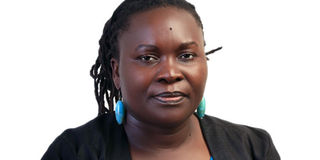Negotiating media culture to promote gender equality

What you need to know:
Empowerment. There is also need to rethink the existing models of women empowerment and the gender equality agenda and how private institutions can comply with national policy requirements on gender, diversity and inclusion of women and other marginalised groups.
As I write this week’s column, I am trying not to think about these crazy times of some flu. So let me stick with my women’s agenda.
Understanding why diversity and inclusion in media truly matters becomes apparent when we look at how women are represented. The media is our window to the world.
It is easy to imagine another world exists for children through diversity and inclusion, when they can see people like them. Distortion of reality of that world can normalise it.
When I interviewed women in various areas of public life about their engagement with media, I wanted them to describe their relationship with the media, hoping to answer a nagging question.
Having realised from an earlier research that contrary to the belief that the media denied women opportunities to speak, the evidence was overwhelming that many journalists tried to engage women as sources and participants in public discourse, with little success.
Sadly, the media for most of these women is ‘a double-edged sword’. I found that majority preferred to avoid the media. Every single one of them told me about how they believed the media could make or break them. They were pushing back by avoiding the media. Some felt many of the programmes were not interesting and exclusive by nature.
For decades, research on media and women has documented media gender gaps from the United States to South Africa, where the glass ceiling studies have highlighted challenges. Locally, Uganda Media Women’s Association (UMWA) has documented many cases of gender injustice in the media while rewarding those who do better.
Still, the media is accused of perpetuating a culture of discrimination against women in society by the very absence, trivialisation or demeaning of women’s stories.
For some, the media may carry significant norms and values in society as well as a powerful role in constructing and reinforcing stereotypes. But how can we negotiate and change media culture to promote gender equality and women’s empowerment? Culture is not static and can be negotiated.
The Beijing Platform of Action in 1995 recognised that the media had the potential to make a far greater contribution to the advancement of women by impacting on public policy, private attitudes and behaviour. It placed the responsibility on media for good will to act. Not much has come out of that commitment and it remains relevant.
There are several ways that journalists can meaningfully influence newsroom cultures today because much has changed around media practice that have broken some of the walls of gatekeeping. That also means women should not wait to be invited to that space, they can join in. Better still, it allows them to hold media professionals accountable to good reporting.
Female journalists can also help by ensuring they fully belong to the table by speaking up. Complaints about sexual harassment by bosses and sources, being given soft stories rather than challenging ones to do on the basis of sex and so on are never spoken about when it matters. Speaking up will enable them to fully own their presence on the table or leave when respect is no longer served.
Mentorship of younger female journalists can help. Many women are brilliant story tellers. I can think of so many good journalists and editors who are women. These women in news can negotiate and earn their keep on the table, modelling excellence.
There is also need to rethink the existing models of women’s empowerment and the gender equality agenda and how private institutions can comply with national policy requirements on gender, diversity and inclusion of women and other marginalised groups.
Negotiating with male colleagues is crucial. Men can be powerful allies when convinced with good reason and evidence on the table. One must draw boundaries and pursue professionalism with colleagues. Because competence really matters in media, the trick is to be ready, to be prepared to work hard and be confident. The bar is sadly higher for women, but women who are comfortable on the table, can also raise the bar for men by demanding excellence, not just from fellow women but men too.
I also believe women need to make use of the Media Council to complain when degraded by insensitive reporting. Journalists need not get away with anything and everything.
More importantly, women in public life need to deliberately cultivate basic media engagement skills, especially those who do not have big public relations system. Only then, can they challenge and confront negative portrayal in media and other areas of public life.
I hope more women appreciate the role of media as they grow professionally. If women are not willing to engage, the misrepresentation and limited access will continue. As the media landscape changes, it brings opportunities for women to change the narrative. Even then, changing media culture is not just for women. If we are not deliberate about including women meaningfully in the stories we tell, we are telling our daughters that they cannot aspire for greatness because they can not imagine it.
Ms Maractho is the head and senior lecturer, Department of Journalism and Media
studies at UCU. [email protected]


